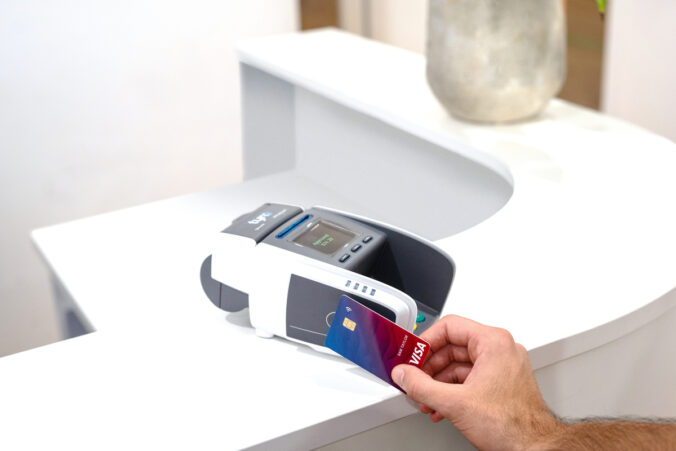5 ways to reduce patient debt and improve cash flow: a guide for practice managers

Business Strategies

With the ACCC’s increased scrutiny on surcharging practices and potential government intervention, the topic of surcharging has become a hot button issue.
As a practice owner, manager or provider in the health industry, you know that the vast majority of your patients or clients are paying on card these days. The Reserve Bank of Australia’s (RBA) Consumer Payments Survey suggests that as of 2022, cash payments represented just 13 percent of in-person transactions, continuing the downward trend that has been underway for nearly two decades.
For most businesses, when someone makes a cashless transaction – by tapping their card or mobile device to your EFTPOS device – there is a cost for using the technology that moves the money from their account to your business bank account. This cost is known as a ‘transaction fee’ or ‘merchant service fee’.
One way for businesses to reduce the costs associated with this fee is to pass it on to the payer as a small surcharge that is added to the total transaction amount. So, in simple terms, instead of your business incurring the cost of the transaction, the payer covers it at the time of payment, effectively increasing their out-of-pocket expense. This is known as ‘surcharging’.
While the practice of surcharging has been less common in healthcare, there has been a shift recently as healthcare businesses look to recover increasing operational costs.
In fact, according to Tyro Health data, 25% of all transactions made by healthcare businesses now include a surcharge. Over the last year, the percentage of transactions with a surcharge has doubled.
Yes, while businesses can choose to pass on a surcharge, the RBA has strict regulations to ensure that the surcharge rate is less than – or equal to – the amount you incur to process card transactions. This is called your ‘cost of acceptance’.
The decision to pass on a transaction fee to patients or clients can be a complex, and stressful, experience. Flexible, health-focused payment solutions such as Tyro Health, make it easier to adapt to the evolving payments landscape and deliver a more tailored approach to accepting card payments that suits the needs of your practice.
Some practices may decide that surcharging is not for them and choose to absorb transaction fees into their overall service costs. This decision often involves balancing financial considerations with patient satisfaction and viewing fees as simply a cost of doing business. For example, how some businesses adjust their pricing to cover the cost of adopting technology like an online booking system that gives patients the convenience of booking an appointment online vs charging a booking fee.
However, with 76% of Australians choosing card payments, it’s becoming increasingly difficult to avoid transaction fees altogether. To stay competitive and maintain profitability, whilst also balancing patient affordability, it’s important to choose a payment solution that offers flexibility.
For example, it’s common for payment solution providers, like Tyro Health, to enable practices to set separate fees for accepting credit and debit transactions, with the cost of accepting debit card payments often being lower. Given this, as a way of balancing the financial health of the practice with affordability, a practice may decide to apply a surcharge when a patient chooses to pay with credit card but not when paying with a debit card. This way, the practice can offer a lower cost option for more vulnerable or price sensitive patients.
Here at Tyro Health, we make surcharging simple. We offer an automated surcharge feature, so you don’t have to waste time manually calculating and applying surcharges.
With Dynamic Surcharging1 you have the flexibility to turn surcharging on or off with ease – as and when it suits your practice. What’s more, you can also choose to tailor the surcharge if you would prefer to only pass on part of the transaction fee – or set a different rate for credit card payments and eftpos debit cards.
How Dynamic Surcharging works
Tyro’s Dynamic Surcharging allows you to set a surcharge rate across a range of card types via your web-based Tyro Portal, including Mastercard, Visa, eftpos, UnionPay and American Express, JCB.
How your surcharge rates are set with Tyro
It’s up to you what rate you choose to surcharge but you should keep in mind your cost of acceptance for each card type. So, you can make a more informed decision on surcharging whilst staying within the boundaries of the RBA surcharging guidelines, Tyro provides your cost of acceptance for you in your Tyro Portal. Tyro calculates your cost of card acceptance by taking an average of the cost of all transactions that you have processed for each eligible card type, over the previous 12 months. We also provide you with the choice to include the cost of the machine rental fee into your cost of acceptance.2
Once everything is set, your Tyro EFTPOS machine3 is then able to dynamically detect the card presented by your customer and automatically apply the correct configured surcharge, allowing you to recover your fees easily. When Dynamic Surcharging is enabled and patients pay, the Tyro EFTPOS machine screen will display ‘Surcharge may apply’ along with the total transaction amount. Pressing the ‘Info’ button on the machine will display the details of the surcharge rates.
If you’re a Tyro customer and want to know how to enable Dynamic Surcharging, head here.
If you’re a Tyro customer and want to review or adjust your Tyro surcharge preferences, simply log into the Tyro Portal and head to Self-service > Surcharging.
We also have signage templates which can be used to inform customers of surcharges, including specific rates.
If you need more information, feel free to contact us, and we’d be happy to help.
Making the decision to accept cash in your practice can be costly. While offering the choice for patients to pay with cash is right for some businesses, ultimately the perceived advantages of avoiding cashless payments can come at the cost of time, money and security.
A recent report estimates there’s a 3.9% cost-per-transaction for dealing with cash at the point-of-sale (POS) for businesses, compared to an average of 1.8% for card payments.
With cashless payments, you can integrate your payment processors with your accounting software, so all your transactions are inputted automatically, saving time and considerably minimising the risk of human error or the risk of theft.
Read our blog to find out whether surcharging is right for your health business.
To learn more about surcharging, such as applying refunds (e.g. the surcharge must be refunded too), take a look at the following links.
Australian Taxation Office – GST and surcharging
RBA – Card payment regulations explained
ACCC – Merchant and consumer information
Disclaimers